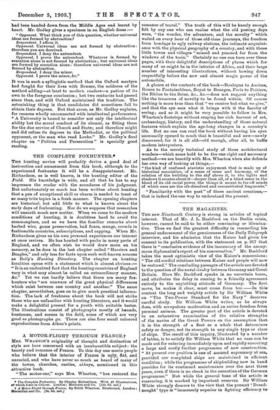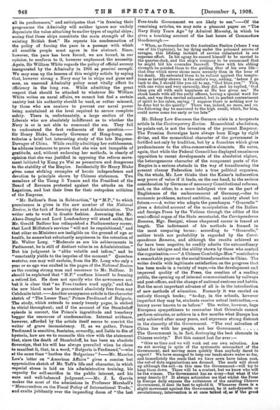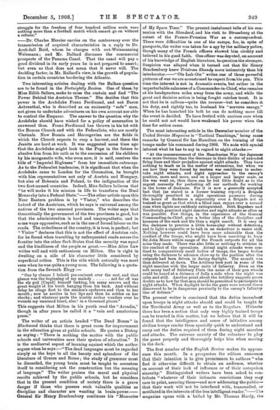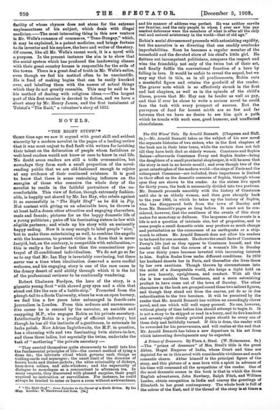THE MAGAZINES.
THE new Nineteenth Century is strong in articles of topical interest. That of Mr. J. L. Bashford on the Berlin crisis, however, cannot be said to be either convincing or illumina- tive. Thus we find the greatest difficulty in reconciling his general endorsement of the genuineness of the Daily Telegraph interview, and his admission that the Kaiser had given his consent to its publication, with the statement on p. 917 that there is "conclusive evidence of the inaccuracy of the anony- mous diplomatist's report of his conversation." Mr. Bashford takes the most optimistic view of the Kaiser's concessions: "The old cordial relations between Kaiser and people will now be restored." The concluding passages of the article are devoted to the question of the naval rivalry between Gei.many and Great Britain. Here Mr. Bashford speaks in no uncertain tones, and attributes the delay in coming to a friendly agreement. entirely to the unyielding attitude of Germany. The first. move, be makes it clear, must come front ber.—In this. context the long and weighty article by Sir William White on "The Two-Power Standard for the Navy" deserves. careful study. Sir William White writes, as be always does, with scrupulous moderation and an entire freedom from personal animus. The greater part of the article is devoted to an exhaustive examination of the relative strengths of the navies of the Great Powers on the assumption that. it is the strength of a fleet as a whole that determines. safety or danger, not its strength in any single type or class of ships. The result of this inquiry, illustrated by a number of tables, is to satisfy Sir William White that no case can be made out for entering immediately upon and rapidly executing a large and costly further programme of new construction. "At present our position is one of assured supremacy at sea, provided our completed ships are maintained in efficient. condition; while the programme of shipbuilding now in hand provides for its continued maintenance over the next three years, even if there is no check in the execution of the German programme." But while the general tone of the article is reassuring, it is marked by important reserves. Sir William White strongly demurs to the view that the present 'Dread- nought' type is "immensely superior in fighting efficiency to.
all its predecessors," and anticipates that "in framing their programme the Admiralty will neither ignore nor unduly depreciate the value attaching to earlier types of capital ships ; seeing that these ships constitute the main strength of the existing British fleet." He repeats his condemnation of the policy of forcing the pace in a passage with which all sensible people must agree in the abstract. Since, however, the pace has been forced, we are bound, in our opinion, to conform to it, however unpleasant the necessity. Again, Sir William White regards the policy of official secrecy inaugurated by the Admiralty in 1905 as pessimi exempli. We may sum up the lessons of this weighty article by saying that, however strong a Navy may be in ships and guns and men, an unsound Admiralty policy must vitally affect its efficiency in the long run. While admitting the great respect that should be attached to whatever Sir William White writes on naval affairs, we cannot but feel a certain anxiety lest his authority should be used, or rather misused, by those who are anxious to prevent our naval power being maintained at the level required to secure complete safety. There is, unfortunately, a large section of the Liberals who are absolutely indifferent as to whether the Navy is or is not able to command the sea. They fail to understand the first rudiments of the question.
Sir Henry Blake, formerly Governor of Hong-kong, con- tributes a brief but interesting study of the late Empress. Dowagerof China. While readily admitting her ruthlessness, he adduces instances to prove that she was not incapable of gratitude, and, without endorsing her methods, is clearly of opinion that she was justified in opposing the reform move- ment initiated by Kew yu Wei as premature and dangerous to the stability of the Empire. Incidentally Sir Henry Blake gives some striking examples of heroic independence and devotion to principle shown by Chinese statesmen. Two members of the Tsung Ii Yemen and the President of the Board of Revenue protested against the attacks on the Legations, and lost their lives for their outspoken criticism of the Empress.
"Mr. Balfour's Sum in Subtraction," by " M.P.," to which prominence is given in the new number of the National Review, is the task of forming the next Administration. The writer sets to work in drastic fashion. Assuming that Mr. Akers-Douglas and Lord Londonderry will stand aside, that Mr. Gerald Balfour has relinquished a Parliamentary career, that Lord Midleton's services "will not be requisitioned," and that other ex-Ministers are ineligible on the ground of age or health, be somewhat reluctantly acquiesces in the retention of Mr. Walter Long. "Moderate as are his achievements in Parliament, he is still of distinct value in an Administration." But his judgment is "alike volatile and infirm," and he "constantly yields to the impulse of the moment." Quantum mutatus, one may well exclaim, from the Mr. Long who only a year or so ago was exalted in the pages of the National Review as the coming strong man and successor to Mr. Balfour. It should be explained that " M.P." confines himself to framing a retired list. He does not specify who the newcomers are, but it is clear that "no Free-traders need apply," and that the new blood must be guaranteed absolutely free from any Cobdenite taint.—Another anonymous article is the character sketch of "The Lesser Tsar," Prince Ferdinand of Bulgaria. The study, which extends to nearly twenty pages, is etched in vitriol throughout; and if the account of the Stambuloff episode is correct, the Prince's ingratitude and treachery beggar the resources of condemnation. Internal evidence, however, afforded by the article itself seems to convict the writer of grave inconsistency. If, as we gather, Prince Ferdinand is sensitive, feminine, cowardly, and liable to fits of hysteria, how are we to reconcile this view with the statement that, since the death of Stambuloff, he has been an absolute Sovereign, that his will has always prevailed when he chose to manifest it, that, in a word, "Bulgaria is Ferdinand,"—who at the same time "loathes the Bulgarians" ?—..Mr. Maurice Low's letter on "American Affairs" gives a concise but appreciative sketch of Mr. Taft's life and character, in which especial stress is laid on his administrative training, his -capacity for self-sacrifice in the public interest, and his -sane and well-balanced judgment.—Mr. J. L. Garvin makes the most of the admissions in Professor Marshall's " Memorandum on the Fiscal Policy of International Trade," and exults jubilantly over the impending doom of "the last
Free-trade Government we are likely to see."—Of the remaining articles, we may note a pleasant paper on " The Navy Sixty Years Ago" by Admiral Moresby, in which he gives a touching account of the last hours of Commodore Goodenough :—
" When, as Commodore on the Australian Station (where I was one of his Captains), he lay dying under the poisoned arrows of savages, this lifelong instinct of service culminated in one supreme effort. In his agony he caused himself to be carried to the quarter-deck, and the ship's company to be summoned that he might bid his comrades farewell. There with his ebbing strength he pointed them to the guiding Star of his own life— that Star which never shone more serenely than in the hour of his death. He entreated them to be valiant against the tempta- tions so lavishly strewn in the sailor's way, adding, before I go back to die, I should like you all to say, "God bless you." This, with one voice and very earnestly, they did, and he replied, God bless you all with such happiness as He has given me.' He shook hands with all the petty officers, having a special word for each, and was then carried exhausted, but in perfect contentment of spirit to his cabin, saying, 'I suppose there is nothing now to be done but to die quietly.' There was, indeed, no more, and oa the following day he answered to the high recall, which, for him, could never come too early or too late."
Mr. Sidney Low discusses the German crisis in a temperate article in the Contemporary Review. Monarchical absolutism, he points out, is not the invention of the present Emperor. The Prussian Sovereigns have always been Kings by right divine, and the monarchical character of the government is fortified not only by tradition, but by a franchise which gives predominance to the ultra-conservative elements. He notes, again, that while the Federal Council has displayed unanimous opposition to recent developments of the absolutist regime, the heterogeneous character of the component parts of the Empire is a serious obstacle in the way of transforming the present clumsy Federation into a true political organism. On the whole, Mr. Law thinks that the Kaiser's indiscretion may prove of value if it leads, on the one hand, to the serious consideration by Germans of necessary Constitutional reforms, and, on the other, to a more indulgent view on the part of Englishmen of the embarrassment of Germany,—due to economic problems, natural ambition, and anxiety about her future.—A writer who adopts the pseudonym " Granvelle " gives a detailed account of the manipulation of the Italian and foreign Press by the Vatican through the editor of the semi-official organ of the State secretariat, the Corrispondenza Romana, Mgr. Benigni, whose chequered career is traced at length. The indictment of his methods is framed in the most unsparing terms : according to " Granvelle,"
neither truth nor probability is regarded by the Corni- spondenza Romana, and although the results achieved so far have been negative, he readily admits the extraordinary
talent for intrigue and the ability shown by those who control the organisation.—" A Chinese Cambridge-Man "contributes a remarkable paper on the social transformation in China. The writer dwells with legitimate satisfaction on the progress that has been made in a variety of ways,—in the development and improved quality of the Press, the creation of a reading public, the opening up of internal communications by railways and post-offices, and the change of national customs and habits. But the most important advance of all is in the introduction of new methods of education. Formerly it was carried on entirely through books ; "to-day, in the schools, however imperfect they may be, students receive actual instruction,—a luxury never known to us before." The writer, however, begs European sympathisers to remember that Orientals cannot perform miracles, or achieve in a few months what Europe has only achieved after many years, and expresses strong distrust in the sincerity of the Government. "The real salvation of China lies with her people, not her Government The Government is, in fact, destroying the best elements in Chinese society." But this cannot last for ever :—
" Give us time and we will work out our own salvation. Are we not moving in spite of the systematic misconduct of the Government., and moving more quickly than anybody dared to expect We have managed to keep our heads above water so fax, and immediately the seeds that we have sown have taken root, the out-of date organisations are doomed. The seeds will shoot up although the soil—in this case the Government—will try to keep them down. There will be a contest, but we know who will be the winner. The Government has an army—but what if the army deserts it? It always astonishes me that whilst the Press in Europe daily exposes the rottenness of the existing Chinese Government, it does its beat to uphold it. Whenever there is a slight movement against the Government, be it anti-dynastic or revolutionary, intervention is at once talked of, as if the great struggle for the freedom of four hundred million souls were nothing more than a football match which cannot go on without a referee."
—Dr. Charles Mercier carries on the controversy over the transmission of acquired characteristics in a reply to Dr.
Arch dell Reid, whom he charges with out-Weismanning Weismann ; and Mr. Ballard discusses the commercial prospects of the Panama Canal. That the canal will pay a good dividend in its early years be is not prepared to assert; but even so that does not mean that it never will. The deciding factor, in Mr. Ballard's view, is the growth of popula- tion in certain countries bordering the Atlantic.
Two interesting articles dealing with the Balkan question are to be found in the Fortnightly _Review. One of these, by Miss Edith Sellers, seeks to raise the curtain and find "The Power Behind the Austrian Throne." She decides that this power is the Archduke Franz Ferdinand, and not Baron Aehrenthal, who is described as an eminently "safe" man, not given to undertake adventures on his own account nor able to control the Emperor. The answer to the question why the .Archduke should have wished for a policy of annexation is answered thus. Franz Ferdinand has thrown in his lot with the Roman Church and with the Federalists, who are mostly Clericals. Now Bosnia and Herzegovina are the fields in which the Church expects to reap a harvest, and there the Jesuits are hard at work. It was suggested some time ago that the Archduke might look to the Pope in the future to absolve him from his oath as to the succession of his children by his morganatic wife, who even now, it is said, receives the title of "Imperial Highness" from her immediate entourage. As to the Federalist tendencies, it is significant that when the Archduke came to London for the Coronation, he brought with him representatives not only of Austria and Hungary, but also of Bohemia and Poland, to the indignation of the two first-named countries. Indeed, Miss Sellers believes that "be will make it his mission in life to transform the Dual Monarchy into a Federal Stete."—The other article upon this Near Eastern problem is by " Viator," who describes the hatred of the Austrians, which he says is universal among the natives of the two annexed provinces. The writer says that theoretically the government of the two provinces is good, but that the administration is hard and unsympathetic, and in some ways oppressive, such as in the use of forced labour on the roads. The orderliness of the country, it is true, is perfect; but " Yiator " declares that this is not the effect of Austrian rule, for he found when travelling by unfrequented roads across the frontier into the other Serb States that the security was equal and the kindliness of the people as great.—Miss Alice Law writes well and with enthusiasm on Milton. She is right in dwelling on a side of his character little considered by superficial critics. This is the side which naturally was most seen when he was quite a young man. The following is a quota- tion from the Seventh Elegy :—
"One by chance I beheld pre-eminent over the rest, and that glance was the beginning of my malady not far off was the sly god [Cupid] himself lurking, his many arrows and the great weight of his torch hanging from his back. And without delay he clings first to the maiden's eyebrows and then to her mouth ; now he nestles in her lips and then he settles on her cheeks ; and whatever parts the nimble archer wanders over he wounds my unarmed heart, alas ! in a thousand places."
This suggests that Milton in his youth read the "Arcadia," though in after years he called it a "vain and amatorions poem."
The writer of an article headed "The Dead Bones" in Blackwood thinks that there is great room for improvement in the education given at public schools. He quotes a Bishop as saying : "There is nothing the matter with the public schools and universities save their system of education." It is the mediaeval aspect of learning against which the author argues when he says :—" The dead languages must he regarded simply as the keys to all the beauty and splendour of the
literature of Greece and Rome ; the study of grammar must
be discarded, the young brain must be taught to accustom itself to considering not the construction but the meaning of language." The writer praises the moral and physical results achieved by the public schools, but he considers that in the present condition of society there is a grave danger if those who possess such valuable qualities as discipline and character are wanting in brain-power.-
General Sir -Henry Brackenbury continues his "Memories
of My Spare Time." The present instalment tells of his con- nexion with the Standard, and his visit to Strasaburg at the outset of the Franco-Prussian War as a correspondent. There were difficulties in one of the camps, for, in spite of passports, the writer was taken for a spy by the military police, though many of the French officers showed him civility and believed in his good faith. One officer was deputed, on account of his knowledge of English literature, to question the stranger. Suspicion was allayed when it turned out that Sir Henri Brackenbury knew Tristram Shandy more intimately than hie interlocutor.—" Ole Luk-Oie" writes one of those powerfnl pictures of war we are acoustotned to expect from his pen. This time the interest is not in dramatic events, but rather in the
imperturbable calmness of a Commander-in-Chief, who remains at his headquarters miles away from the army, and while the great and decisive action is being fought catches trout. It is not that he is callous—quite the reverse—but he considers it his duty, and rightly too, to husband his "nervous energy." When he has launched his bolt he can do nothing more till the event is decided. To have fretted with anxious care when be could not act would have weakened his power when the time for action came.
The most interesting article in the December number of the United Service Magazine is "Tactical Teachings," being some remarks by General Sir Ian Hamilton on the training of the troops under his command during 1908. We note with special interest what he has to say in regard to night attacks :—
"At the commencement of the Manchurian War the Japanese were more German than the Germans in their dislike of extended firing lines and their prejudice against night attacks. They have nothing to teach 118 in the matter of extensions, but when we see how they were forced by modern war conditions to under- take night attacks, and night approaches to the enemy's position, more and more, and on a larger and larger scale, as the war went on, then there can be but little doubt as to the urgent necessity for perfecting all our methods for working in the hours of darkness. For it is now a generally accepted fact that (as stated in a former training report) a Brigade thoroughly practised in night operations possesses during the hours of darkness a superiority over a Brigade not so trained as great as that which a blind man enjoys over a normal man when lights are suddenly extinguished. Both Regulars and Territorials practised night marches and night attacks as often as was possible. Few things, in the experience of the General Commanding-in-Chief, give a better idea of the discipline and keenness of the rank and file than a night march. It is easy in the darkness to practise a little horse-play without detection g and to light a cigarette or to talk in an undertone is easier still. Nothing however could have been more admirable than the conduct of the troops, who might have been marching to bury Sir John Moore within range of the French outposts for all the noise they made. There was also little or nothing to criticise in the conduct of the operations. Actual night attacks were con- fined to comparatively small bodies of troops, the larger bodies using the darkness to advance close up to the position after the outposts had been driven in during daylight. The assault was then delivered at dawn. The Artillery took part in some of the night marches with the larger units of Infantry. Even on the soft mossy turf of Salisbury Plain the noise of their gun wheels could be heard at a distance of fully a mile when the night was calm and still. Another point about the Artillery suggests grave doubts as to how far that arm should be permitted to participate in night attacks. When daylight broke the guns were several times discovered to be in dangerous proximity to the enemy's Infantry line of defence."
The present writer is convinced that the duties incumbent upon troops in night attacks should and could be taught to the Territorial Army as well as to the Regulars. Hitherto there has been a notion that only very highly trained troops can be trusted in this matter, but we believe that it will be found that the intelligence and sense of initiative among civilian troops render them specially quick to understand and carry out the duties required of them daring night marches and attacks. The extreme anxiety of the volunteer to play the game properly and thoroughly helps him when moving
in the dark.
The first number of the English Review makes its appear- ance this month. In a prospectus the editors announce that their intention is to give prominence to authors "who
find it otherwise difficult to obtain an audience, whether on account of their lack of influence or of their outspoken sincerity." Distinguished writers have been asked to con- tribute "whatever of their intimate convictions they may care to print, assuring them—and now addressing the public—. that their work will not be interfered with, trammelled, or
mutilated in the interests of the less intelligent reader." —T lie magazine opens with a ballad by Mr. Thomas Hardy, the facility of whose rhymes does not atone for the extreme unpleasantness of his subject, which deals with illegal inedicine.—The most interesting thing in this new venture is Mr. Wells's romance of commerce, " Tono-Bungay," which, it may be explained, is a patent medicine, and brings fortune to its inventor and his nephew, the hero and writer of the story. Of course, like all Mr. Wells's recent work, it is a novel with a purpose. In the present instance the aim is to show that the social system which has produced the landowning classes with their great country houses is responsible for the evils of the towns. There is a great deal of truth in Mr. Wells's satire, even though we feel his method often to be unscientific. He is fond of making bogies that can be easily knocked over, and labelling them with the names of actual things which they do not greatly resemble. This may be said to be lie method of dealing with religious ideas.—The largest part of this first number is devoted to fiction, and we have a -short story by Mr. Henry James, and the first instalment of Tolstoi's "The Raid," a volunteer's story of 1852.









































































 Previous page
Previous page